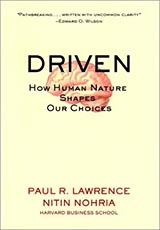My Notes on “Driven – How Human Nature Shapes Our Choices” by Paul R. Lawrence & Nitin Nohria:
There are four innate drives:
- The drive to acquire
- The drive to bond
- The drive to learn
- The drive to defend
The Drive to Acquire
- When subjects are given the choice of living in 2 worlds, in which prices are the same, but in one they earn $90k and their neighbours earn $100k versus another in which they earn $110k but their neighbours earn $200k, they are more likely to choose the former situation. Such behaviour is at odds with standard utility-maximising models of human behaviour – in absolute terms subjects would be better earning $110k instead of $90k. But as the experiment suggests, what humans care about more is their relative status
- From an evolutionary perspective, the purpose of human motivation is not to make us happy but to make us more likely to succeed against the competition. Concerns about relative position are indeed part of the evolved circuitry of the human brain and not just a cultural artefact.
- In ultimatum bargaining games subjects refuse an offer they perceive as unfair. Such concerns of fairness are common in all forms of exchange – from bazaars in Morocco to investment banking deals on Wall Street. Yet they have no place in a world in which human being are purely motivated by self-interest
- How do we explain these behaviours that violate the single-minded pursuit of self-interest? These actions can be seen as investments in reputation that have benefits in the long run, that they are undertaken with the expectation of reciprocity in the future, that the utility function can also include the utilities of others we care about , and so on. In this line of reasoning, altruism is simply seen as a calculated action that confers some gain, however distant or indirect that gain might be.
The Drive to Bond
- Humans need company and meaningful relationships
The Drive to Learn
- Information-gap Learning states that if the subject perceive a small gap in their knowledge they are likely to ignore it. If they perceive a large gap, they experience fear and possibly repress the gap. If they perceive a medium gap they experience intense curiosity and seek to close the gap. Therefore a marketing consultant like myself could point out medium sized information gaps to prospective clients to motivate them to close the gap by hiring me
The Drive to Defend
- Humans defend what is theirs, what they have worked for
Culture, Skills, Emotions – Other Pieces of the Puzzle
- With their drive to learn and related skill sets such as language and abstract reasoning, human could invent and design all varieties of new artefacts. They could reach out to explore the entire globe.
- They could eventually domesticate a variety of plants and animals, greatly increasing their available resources.
- With their drive to bond and related skill sets such as morals, they could create the stable large-scale social institutions necessary for the big construction and irrigation projects of ancient civilisations.
- With their drive to acquire and related skill sets such as the sense of ownership and property rights, they could create and accumulate large stores of items of value.
- With the drive to defend in place they could create weapons and other defensive artefacts.
- These four drives, which together made up what was universal in human nature, provided the foundation for the rapid development of all varieties of human cultures.
